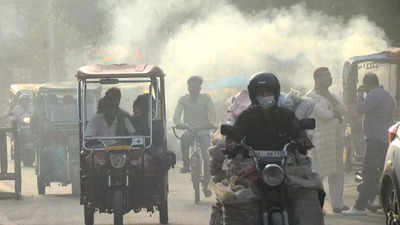Top Searches
- News
- India News
- NHRC issues advisory to Centre, states to prevent and minimise impacts of environmental pollution
NHRC issues advisory to Centre, states to prevent and minimise impacts of environmental pollution

PATNA: The National Human Rights Commission (NHRC) has issued an advisory to the Centre, Bihar government, other state governments and registrar of Patna high court to prevent, minimise and mitigate impacts of environmental pollution and degradation on human rights.
The Commission, headed by Justice Arun Kumar Mishra, has observed that in spite of having one of the world’s best statutory and policy frameworks for environment protection, the country is experiencing a serious problem of air and water pollution and ecological degradation causing impediments in the enjoyment of basic human rights.
The Commission, in a letter through its secretary general Devendra Kumar Singh to the secretaries of concerned Union ministries, chief secretary (Bihar) and head of other states and the registrar of high courts, has asked for the implementation of its recommendations in the advisory and sought an action taken report (ATR) within three months.
“The advisory has focused on five key areas for action by the Centre and the state governments. These include: Punishment of polluters and violators of environmental laws; Prevention and minimization of vehicular pollution; Processing of proposals seeking clearances/ approvals mandated by various environmental laws in an informed, transparent and non-partisan manner; Measures required for development, promotion, propagation and replication of cost effective innovative measures to prevent, minimise and mitigate environmental pollution and degradation and strengthening and capacity building of local bodies,” the commission’s deputy director (media) Jaimini Kumar Shrivastava told TOI on Wednesday.
The NHRC’s important recommendations are that the Union and state governments should make efforts to ensure effective and expeditious punishment of polluters and violators of environmental laws. These efforts should include strengthening of the Pollution Control Boards (PCBs) and other regulatory authorities; creation of separate investigation and prosecution wings in the PCBs and regular training of the staff; making it mandatory for the PCBs to include in their annual reports a chapter containing details of investigation of cases and the state governments should undertake annual performance audit of the state pollution control boards by independent expert auditors.
The commission has also recommended that the state judicial academies, state legal services authorities and district legal services authorities in collaboration with the PCBs should organize workshops, seminars and training programmes on various provisions of environmental laws and harmful impacts of pollution and environmental degradation for all stakeholders; high courts should establish special environmental courts and ensure speedy trial of the cases involving violation of environmental laws, and each local body should establish an environmental cell to plan, supervise and monitor various activities to prevent, minimize and mitigate environmental pollution/degradation and for waste management, Shrivastava said.
The Commission, headed by Justice Arun Kumar Mishra, has observed that in spite of having one of the world’s best statutory and policy frameworks for environment protection, the country is experiencing a serious problem of air and water pollution and ecological degradation causing impediments in the enjoyment of basic human rights.
The Commission, in a letter through its secretary general Devendra Kumar Singh to the secretaries of concerned Union ministries, chief secretary (Bihar) and head of other states and the registrar of high courts, has asked for the implementation of its recommendations in the advisory and sought an action taken report (ATR) within three months.
“The advisory has focused on five key areas for action by the Centre and the state governments. These include: Punishment of polluters and violators of environmental laws; Prevention and minimization of vehicular pollution; Processing of proposals seeking clearances/ approvals mandated by various environmental laws in an informed, transparent and non-partisan manner; Measures required for development, promotion, propagation and replication of cost effective innovative measures to prevent, minimise and mitigate environmental pollution and degradation and strengthening and capacity building of local bodies,” the commission’s deputy director (media) Jaimini Kumar Shrivastava told TOI on Wednesday.
The NHRC’s important recommendations are that the Union and state governments should make efforts to ensure effective and expeditious punishment of polluters and violators of environmental laws. These efforts should include strengthening of the Pollution Control Boards (PCBs) and other regulatory authorities; creation of separate investigation and prosecution wings in the PCBs and regular training of the staff; making it mandatory for the PCBs to include in their annual reports a chapter containing details of investigation of cases and the state governments should undertake annual performance audit of the state pollution control boards by independent expert auditors.
The commission has also recommended that the state judicial academies, state legal services authorities and district legal services authorities in collaboration with the PCBs should organize workshops, seminars and training programmes on various provisions of environmental laws and harmful impacts of pollution and environmental degradation for all stakeholders; high courts should establish special environmental courts and ensure speedy trial of the cases involving violation of environmental laws, and each local body should establish an environmental cell to plan, supervise and monitor various activities to prevent, minimize and mitigate environmental pollution/degradation and for waste management, Shrivastava said.
FOLLOW US ON SOCIAL MEDIA
FacebookTwitterInstagramKOO APPYOUTUBE
Looking for Something?

Start a Conversation
end of article

